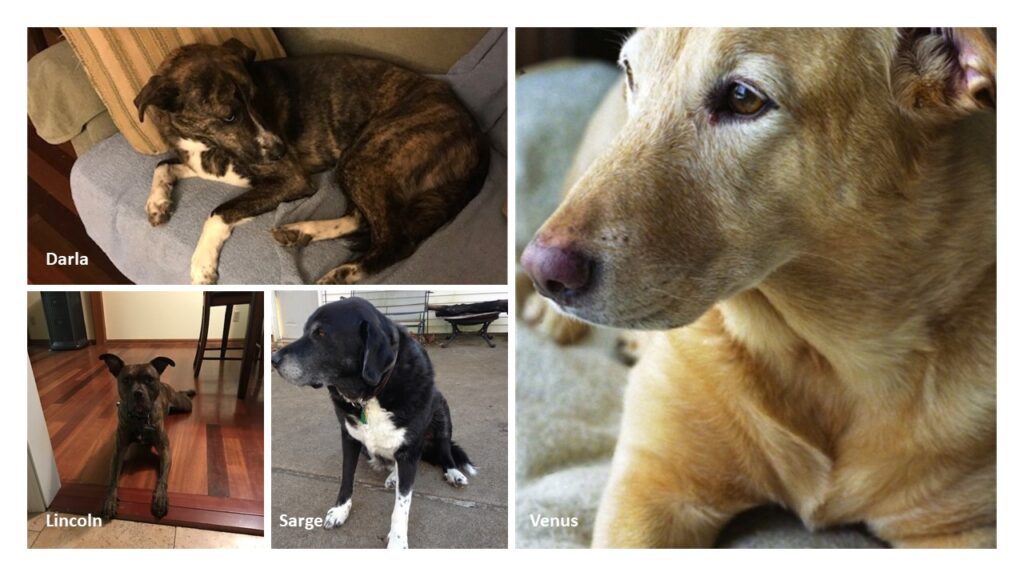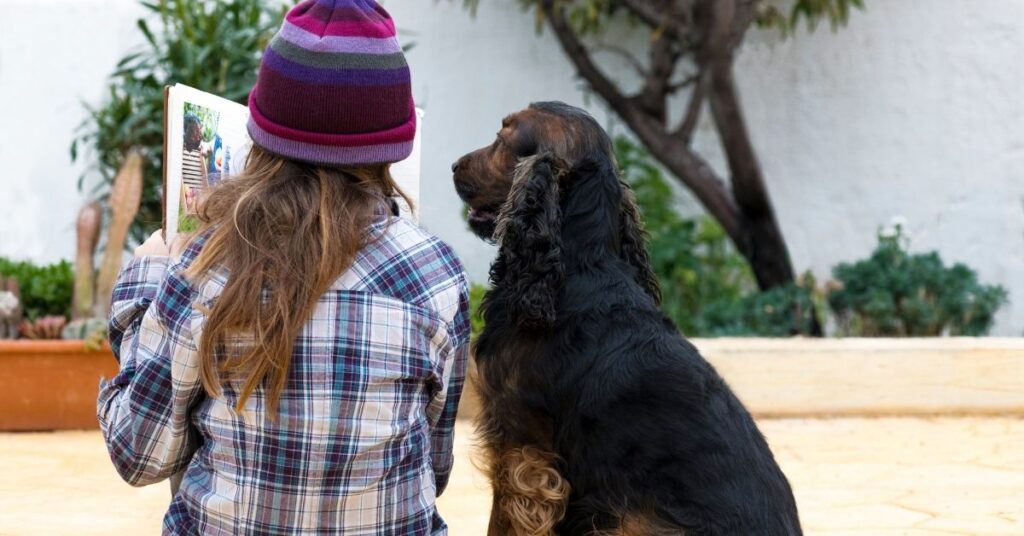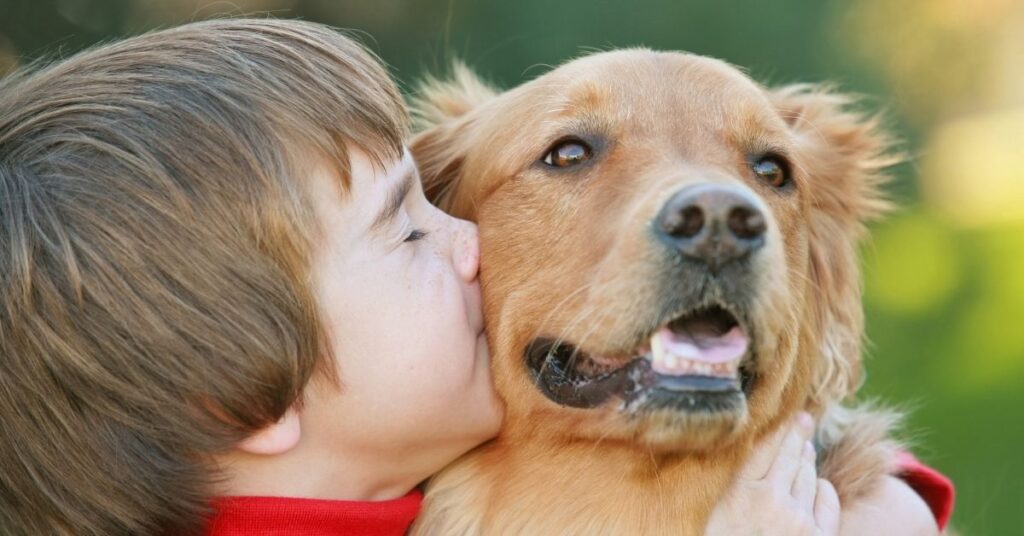Dogs are wonderful creatures, and they can be especially beneficial to children with autism and ADHD. Not only do they make fantastic pets, but they also help our children improve social skills, lower stress, increase confidence, reduce meltdowns and provide emotional support. But what is the best dog for your child with autism and ADHD?
The Fédération Cynologique Internationale (or World Canine Organization) recognizes more than 350 breeds of dog throughout the world. Many times, I hear people ask what is the best dog breed for my child? I think the bigger question first is what type of dog will be best for your child with autism and ADHD?
Our experience with dogs

Our son J has grown up with companion dogs, or family pets. He loves them! He doesn’t really remember my Yellow Labrador because she died when he was two years old. We adopted our Newfoundland mix three years later, and J grew up with Sarge. Sarge was truly the gentle giant, and he was so affectionate. When J or anyone else in the house was sad or upset, he was there to offer us comfort. Unfortunately, we had to say good-bye to our faithful friend when he was 11 years old, and we still miss him so much today.
Now, we have two dogs – one is a half husky/half mutt named Darla and the other an incredibly goofy American Staffordshire Terrier/Boxer/who-knows-what-else mix named Lincoln. Darla was trained to be a therapy dog by her foster mom. However, she was adopted by a couple who abused her, and she was never able to finish her certification. We have thought about trying to finish her training; however, she is too afraid of loud and strange noises, large items and other things to take her into public like stores, schools and other places. So, she uses her skills to be our therapy dog at home.
I truly believe all of our dogs have played a significant positive role in J’s life.
What type of dog does your child need?
When you have a child with autism and ADHD, it’s important to determine what type of dog will be best for your child. There are three different types:
Companion Dog – This is your family pet that offers companionship to your child and whole family.
Therapy Dog – Therapy dogs provide emotional support to a child and others. They are trained and certified. Many of them usually go with their handlers to schools, nursing homes and hospitals to volunteer and offer support. They can be instrumental in helping an autistic child through meltdowns and calm them in upsetting or anxious situations. They also offer companionship.
Service Dog – Service dogs are trained to provide one-on-one assistance to people with disabilities or special needs. They go through a rigorous training program and are certified. They are allowed to go with your child almost anywhere and are working animals. That means that while they are assisting your child, no one else should pet or try to play with the dog. Many times, they are referred to as “autism assistance dogs” when they are trained to help people with autism.
How are therapy and service dogs different?

Both therapy and service dogs undergo training and certification, but the level and type of training is much different.
Therapy dogs can be trained either by an owner or a trainer who specializes in therapy dogs. The dogs must pass the Canine Good Citizenship test for obedience plus the therapy dog part of the test. Dogs that are naturally calm, affectionate with people and friendly usually make good therapy dogs. Many breeds can make good therapy dogs.
Service dogs begin a rigorous training program as puppies that lasts one to two years. They are trained to provide one-on-one assistance to a person with disabilities to help them with mobility, hearing, guiding and more. Those that are trained to help a person with autism can assist with repetitive behaviors, calm a child during meltdown and keep an autistic child safe. The most popular breeds that make good service dogs include Labradors, German Shepherds, Golden Retrievers, Bernese Mountain Dogs, Poodles, Great Danes, Collies, American Staffordshire Terriers and Pomeranians.
What characteristics should I look for in a dog?
Regardless of what type of dog you decide is best for your child with autism and ADHD, here are some characteristics you should look for in a dog for your child:
- Calm temperament
- Sociable
- Trainable and intelligent
- Energy level that is compatible with your child
Where do I find trained therapy and service dogs?
While there are programs that can help you train your own dog to be a therapy or service dog, most of us autism parents do not have the capacity to take on rigorous training ourselves. (If you do, then the benefit will be that your dog will be trained specifically for the needs of your child.)
Autism Speaks provides a list of autism service dog organizations in the United States. Another listing of service dog organizations can be found on Pathfinders for Autism. Internationally, you can check out Assistant Dogs International for information.
How can I afford a service dog for my child?

Purchasing an autism service dog can be a stretch or even out of reach for many parents. The cost is generally between $15,000 and $30,000. Yet, it can be as high as $50,000.
Fortunately, there are many grant programs to help families who need a service dog for their autistic child. The downside is that these programs may have a waitlist of a few years.
For grant programs for autism service dogs, the American Autism Association has an extensive list.
If you don’t want to wait on a list or want to find a way to purchase the dog yourself, here are some ideas:
- Crowdsource the funding through a GoFundMe or Kickstarter fundraiser campaign.
- Check out this list of 100 fundraising ideas from Anything Pawsable.
- Research to see if you can use your flexible spending account through your employer benefits. This is money used pre-tax, so you will save some out-of-pocket costs. Note that you must use your money from the same calendar year. You cannot roll money from one year to another. Also, you will need a letter of medical necessity from your child’s doctor.
- Add a category to your budget and save for the dog over time.
Where are the best places to adopt a companion dog?
If you have determined a companion dog is best for your child with autism and ADHD, where are good places to adopt them from?
Do you have a specific breed in mind? Then you may want to consider looking into a reputable breeder. If you know someone whose dog has had a litter of puppies, then consider a dog from them as well. (Be sure to stay away from “puppy mills” or pet stores that purchase dogs from puppy mills.)
Dog rescues are another good option. The dogs usually are housed with a foster parent who cares for them. In this case, the foster parent will have a better idea of behavior and other needs of the dog. They also make sure the dog receives medical services and quality food while in their care.
Your local Humane Society and animal shelter also have a wide variety of dogs available for adoption. Keep in mind with both rescue and animal shelter dogs that you don’t know the history of the dog. However, you can find some wonderful dogs through these organizations.
Do you have a dog for your child or family? How did you determine what was the best dog for your child with autism and ADHD? Leave a comment to share your experience so that we can encourage and learn from one another on this journey.







